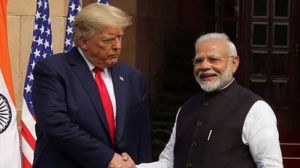Campus that sent him home awaits Mushirul Hasan’s second coming
Twelve years after he was assaulted inside the campus of Jamia Millia Islamia for his criticism of the Government’s ban on Salman Rushd...

Twelve years after he was assaulted inside the campus of Jamia Millia Islamia for his criticism of the Government’s ban on Salman Rushdie’s The Satanic Verses—the book is still banned—historian and liberal scholar Mushirul Hasan is set to return to head the institution as its Vice-Chancellor.
His name was forwarded by the new Human Resource Development Minister, Arjun Singh to President A P J Abdul Kalam last week. The notification was issued today. He replaces Vice Chancellor Syed Shahid Mahdi, who retires tomorrow.
Speaking to The Indian Express, Mahdi said: ‘‘He is the best professor the university has had and I am happy that I will hand over charge to him.’’
Hasan, away in Paris on a teaching assignment, was not available for comment. But some of his colleagues who called up and congratulated him said that he told them he would try to return to the Capital by the middle of next week.
That Arjun Singh reposes faith in Hasan is evident from the fact that he figures in the four-member search panel set up to find a successor to the controversial J S Rajput, who headed NCERT for the past five years.
Hasan’s appointment as Vice Chancellor of Jamia was welcomed by his faculty colleagues. With the fatwa on Rushdie withdrawn quite some time back, the strong views on The Satanic Verses have largely faded away. And similarly the anger against Hassan has also petered out.
Said Rizwan Kaiser, secretary Jamia Teachers Association (JTA): ‘‘Hasan’s appointment definitely means better times for the university for various reasons. First, as a Jamia academic, he is already well-versed with the university. Secondly he has had administrative experience.’’
In fact, a vision plan for the university for the next 20 years has already been prepared and Hasan has worked closely with Mahdi on the plan.
Even one of his staunchest critics and senior Congress leader Salman Khurshid has done a rethink: ‘‘I was never against Professor Hasan’s views. I was only critical of the manner and position in which those views were expressed.
He is a fine scholar and the search panel must have selected his name for his outstanding scholarship.’’
In 1992, when he was Pro-Vice Chancellor at Jamia, his remarks in an interview provoked a section of students to attack him on campus. He had criticised the ban on Rushdie’s novel saying: ‘‘Everybody has a right to be heard and read.’’
Recalling that experience, Hassan later said in an interview to a US university journal: ‘‘As I went to my office…250 students physically attacked me, climbing up to second floor of the building with pipes and clubs. I was petrified before and after but not then. I could face them. They had to swallow my spectacular entry into the university.’’
Hasan remained pro-VC but was off campus until he returned for a brief 10 months in 1996 as the officiating Vice Chancellor. By then, anger against him had greatly subsided. ‘‘I never wanted to leave Jamia, so I never sought to do so,’’ he said. Since that brief stint, Hasan has been visiting professor at several campuses worldwide and is now Director, Academy of Third World Studies at Jamia.
His emotional attachment to Jamia perhaps has its roots in his becoming the youngest professor of history in the country at the university. ‘‘I was 31…It (Jamia) is an interesting place and I thought there were interesting things I could do.’’
Meanwhile, most of the students The Indian Express spoke to are eager to have Hasan back. Said Mohsin Ali Khan, BA (English), Final Year, ‘‘The atmosphere has changed. There will be no adverse reaction. He is a reputed historian.’’ Tarannum Jafri, doing M Phil in Education, felt, ‘‘He does not have a lopsided philosophy. He will be a good administrator.’’
Saba Khan MA (English) Final Year disagreed: ‘‘There is no students’ union now. If there was one, there would have been opposition to his appointment. There are many who still think he is anti-Muslim.’’





- 0117 hours ago
- 0218 hours ago
- 0318 hours ago
- 0418 hours ago
- 052 hours ago


![Kadapa, [Andhra Pradesh], 27 May (ANI): Andhra Pradesh Chief Minister N Chandrababu Naidu and state Minister Nara Lokesh in conversation during the Telugu Desam Party's (TDP) annual three-day Mahanadu conclave, in Kadapa on Tuesday. (ANI Photo)](https://images.indianexpress.com/2025/05/tdp.jpg?w=400)





![Kadapa, [Andhra Pradesh], 27 May (ANI): Andhra Pradesh Chief Minister N Chandrababu Naidu and state Minister Nara Lokesh in conversation during the Telugu Desam Party's (TDP) annual three-day Mahanadu conclave, in Kadapa on Tuesday. (ANI Photo)](https://images.indianexpress.com/2025/05/tdp.jpg?w=300)

















